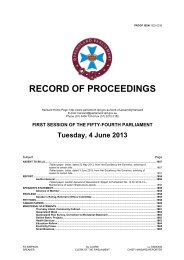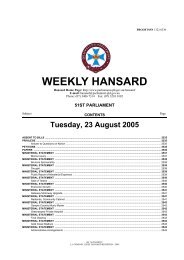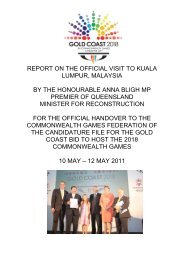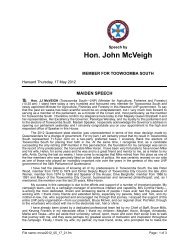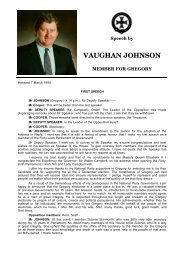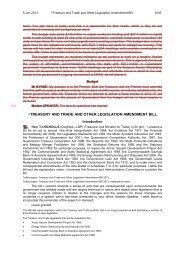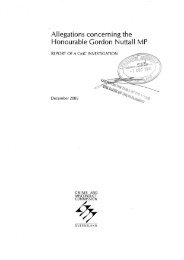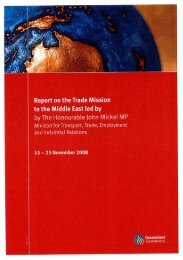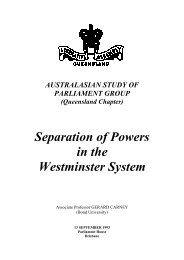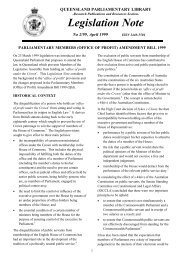RECORD OF PROCEEDINGS - Queensland Parliament ...
RECORD OF PROCEEDINGS - Queensland Parliament ...
RECORD OF PROCEEDINGS - Queensland Parliament ...
You also want an ePaper? Increase the reach of your titles
YUMPU automatically turns print PDFs into web optimized ePapers that Google loves.
2300 South East Qld Water (Restructuring) & Or Leg. Amend’t Bill 31 Oct 2012<br />
legislative and contractual framework governing the South-East <strong>Queensland</strong> water market, as well as<br />
providing independent advice on the impacts of petroleum tenure activities on underground water.<br />
South-East <strong>Queensland</strong> has now nearly full water storages and a strongly embedded water efficient<br />
ethos within the community. The continuing need for a commission, a stand-alone, dedicated source of<br />
policy advice, has receded.<br />
The aggregation of ownership and operational responsibility for all grid assets across the region<br />
will give the bulk water authority the capacity to fulfil its rightful role in planning for South-East<br />
<strong>Queensland</strong>’s supply needs. The bill marks a decisive break with the central planning approach<br />
favoured by the previous government, devolving decision making to the entity that will ultimately be<br />
accountable to its bulk water customers. The bill provides for direct bulk water supply agreements<br />
between the merged business and its customers, including the two South-East <strong>Queensland</strong> distributorretailers<br />
and the water businesses of Gold Coast, Redland and Logan City councils. The direct supply<br />
relationship will help reset accountabilities, ensuring customers properly identify their demand needs<br />
and the bulk water entity plans and times the construction and maintenance of infrastructure to meet<br />
that demand. The bill also allows for a regulation to set appropriate levels of service objectives for the<br />
region, ensuring a clear linkage with the South East <strong>Queensland</strong> Regional Plan and enabling service<br />
levels to reflect community expectations on water security and infrastructure investment required to<br />
meet growing or changing demand. The bulk water authority will need to demonstrate how it will achieve<br />
these objectives. The community will have the opportunity to make comment on the regulation, on their<br />
views on water demand and water security.<br />
There has been some media comment about the potential removal of South-East <strong>Queensland</strong>’s<br />
water restrictions. Again I stress that the South-East <strong>Queensland</strong> community continues to use water<br />
efficiently. The demise of the <strong>Queensland</strong> Water Commission does not mean that South-East<br />
<strong>Queensland</strong> will forget the memories of the millennium drought. With the dissolution of the <strong>Queensland</strong><br />
Water Commission, the specific powers and functions of service providers will be more closely aligned<br />
with arrangements outside South-East <strong>Queensland</strong>. For instance, business customers will no longer be<br />
subject to direction from the <strong>Queensland</strong> Water Commission to prepare and comply with water<br />
efficiency management plans. This will be a matter for the service provider to decide. South-East<br />
<strong>Queensland</strong> service providers will be empowered to apply restrictions where necessary and may be<br />
subject to a direction from the Water Supply Regulator.<br />
What we have now is time to consider the best way to manage and implement future restrictions<br />
and any necessary compliance programs. We are not losing or throwing anything away. Rather, the<br />
water businesses, the bulk and the council water businesses together, must keep the community<br />
engaged and informed on water security and water usage. A fair and equitable restriction regime will be<br />
developed and consulted on within the next 12 months. The current market rules, which prescribe<br />
detailed procedures, approvals and protocols governing the activities of South-East <strong>Queensland</strong> bulk<br />
and council water businesses, will be replaced by a South-East <strong>Queensland</strong> Bulk Water Supply Code<br />
focusing on key areas of interaction between the bulk entity and its customers. The overriding objective<br />
is to simplify the complex operating and regulatory environment while allowing government to maintain<br />
appropriate oversight and policy responsibility in key areas such as water pricing.<br />
The <strong>Queensland</strong> Water Commission’s functions as they relate to obtaining and analysing data<br />
about the impacts of underground water rights will be taken over by a new statutory office, the Office of<br />
Groundwater Impact Assessment. The functions of the office will be separated from those of the<br />
departmental chief executive under the Water Act 2000, ensuring a proper segregation of roles—that is,<br />
one agency will not be charged with the dual roles of preparing and approving underground water<br />
impact reports. The bill also removes a number of costly processes imposed on South-East <strong>Queensland</strong><br />
councils under the previous government’s Fairer Water Prices for SEQ Amendment Act 2011, including<br />
the preparation of a five-year price path commencing 1 July 2013. South-East <strong>Queensland</strong> councils<br />
have strongly argued that such mandated token processes fail to recognise their responsibility and<br />
accountability to residents. The one-off publication of a five-year price path by councils does nothing to<br />
reduce prices or improve their accountability to residents. The South-East <strong>Queensland</strong> councils and the<br />
government both have a job to do to keep water prices as low as possible.<br />
The bill also amends the Water Fluoridation Act 2008, which imposes a mandatory obligation on a<br />
public potable water supplier to fluoridate a relevant public potable water supply for which they are<br />
responsible if the supply services at least 1,000 members of the public. Since April 2012, a number of<br />
water suppliers have requested deferral or exemption from the requirement to fluoridate due to the<br />
upfront and ongoing cost of fluoridation, the lack of appropriately trained staff to operate the fluoridation<br />
infrastructure and the need to rectify ongoing water quality problems as a matter of priority. While the act<br />
enables a water supplier to apply for an exemption from the requirement that they must fluoridate, the<br />
current criteria do not adequately recognise some of the challenges being faced by water suppliers.<br />
In response to this situation, it is proposed that the act be amended to expand the criteria under<br />
which a water supplier may apply for an exemption. The new grounds for exemption have been<br />
developed having regard to the challenges facing water suppliers as well as the object of the act, which<br />
is to promote good oral health by the safe fluoridation of drinking water. The underlying object of the act



